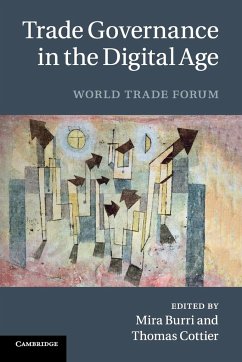Trade Governance in the Digital Age
Herausgeber: Burri, Mira; Cottier, Thomas
Trade Governance in the Digital Age
Herausgeber: Burri, Mira; Cottier, Thomas
- Broschiertes Buch
- Merkliste
- Auf die Merkliste
- Bewerten Bewerten
- Teilen
- Produkt teilen
- Produkterinnerung
- Produkterinnerung
This book addresses pressing questions concerning international trade regulation which have been raised by the Internet revolution.
Andere Kunden interessierten sich auch für
![Tax and MSMEs in the Digital Age Tax and MSMEs in the Digital Age]() Regina Niken WilantariTax and MSMEs in the Digital Age78,99 €
Regina Niken WilantariTax and MSMEs in the Digital Age78,99 €![Business in the Age of Extremes Business in the Age of Extremes]() Business in the Age of Extremes37,99 €
Business in the Age of Extremes37,99 €![Business in the Age of Extremes Business in the Age of Extremes]() Business in the Age of Extremes107,99 €
Business in the Age of Extremes107,99 €![Economic Policy in the Age of Globalisation Economic Policy in the Age of Globalisation]() Nicola AcocellaEconomic Policy in the Age of Globalisation175,99 €
Nicola AcocellaEconomic Policy in the Age of Globalisation175,99 €![Navigating the Circular Age of a Sustainable Digital Revolution Navigating the Circular Age of a Sustainable Digital Revolution]() Navigating the Circular Age of a Sustainable Digital Revolution466,99 €
Navigating the Circular Age of a Sustainable Digital Revolution466,99 €![Storytelling in the Digital Age Storytelling in the Digital Age]() Julia CampbellStorytelling in the Digital Age35,99 €
Julia CampbellStorytelling in the Digital Age35,99 €![Misinformation, Disinformation and Deepfakes in the Digital Age Misinformation, Disinformation and Deepfakes in the Digital Age]() Bs SodhiMisinformation, Disinformation and Deepfakes in the Digital Age50,99 €
Bs SodhiMisinformation, Disinformation and Deepfakes in the Digital Age50,99 €-
-
-
This book addresses pressing questions concerning international trade regulation which have been raised by the Internet revolution.
Hinweis: Dieser Artikel kann nur an eine deutsche Lieferadresse ausgeliefert werden.
Hinweis: Dieser Artikel kann nur an eine deutsche Lieferadresse ausgeliefert werden.
Produktdetails
- Produktdetails
- Verlag: Cambridge University Press
- Seitenzahl: 502
- Erscheinungstermin: 11. Februar 2015
- Englisch
- Abmessung: 229mm x 152mm x 27mm
- Gewicht: 720g
- ISBN-13: 9781107542617
- ISBN-10: 1107542618
- Artikelnr.: 42791200
- Herstellerkennzeichnung
- Produktsicherheitsverantwortliche/r
- Europaallee 1
- 36244 Bad Hersfeld
- gpsr@libri.de
- Verlag: Cambridge University Press
- Seitenzahl: 502
- Erscheinungstermin: 11. Februar 2015
- Englisch
- Abmessung: 229mm x 152mm x 27mm
- Gewicht: 720g
- ISBN-13: 9781107542617
- ISBN-10: 1107542618
- Artikelnr.: 42791200
- Herstellerkennzeichnung
- Produktsicherheitsverantwortliche/r
- Europaallee 1
- 36244 Bad Hersfeld
- gpsr@libri.de
1. Introduction: digital technologies and international trade regulation
Mira Burri and Thomas Cottier; Part I. Conceptualising Trade 2.0: 2.
Principles for trade 2.0 Anupam Chander; 3. Global information law: some
systemic thoughts Christian Tietje; Part II. Old and New Buzzwords in the
Digital Trade Discourse: 4. Convergence: a buzzword to remain? David Luff;
5. Network neutrality: the global dimension Pierre Larouche; 6. Fostering
innovation and trade in the global information society: the different
facets and roles of interoperability Urs Gasser and John Palfrey; Part III.
The State of Play in Trade and Trade Regulation. Prospects for Change: 7.
GATS classification issues for information and communication technology
services Lee Tuthill and Martin Roy; 8. Towards coherent rules for digital
trade: building on efforts in multilateral versus preferential trade
negotiations Sacha Wunsch-Vincent and Arno Hold; 9. Better regulation for
digital markets: a new look at the Reference Paper? Rohan Kariyawasam; 10.
Googling for the trade-human rights nexus in China: can the WTO help? Henry
Gao; 11. The puzzling interaction of trade and public morals in the digital
era Panagiotis Delimatsis; Part IV. The Impact of Digital Technologies on
the Global Intellectual Property Regime: 12. TRIPS encounters the Internet:
an analogue treaty in a digital age, or the first trade 2.0 agreement?
Antony Taubman; 13. Country clubs, empiricism, blogs and innovation: the
future of international intellectual property norm-making in the wake of
ACTA Daniel Gervais; 14. New forms of governance for digital orphans:
copyright litigation, licenses and legal information Jeremy De Beer; Part
V. Digital Technologies, Intellectual Property and Development: 15. From
consensus to controversy: the WIPO Internet Treaties and lessons for
intellectual property norm-setting in the digital age Ahmed Abdel Latif;
16. The global digital divide as impeded access to content Mira Burri; 17.
Harnessing information and communication technologies for development: the
trade-related technical assistance perspective Martin Labbé; 18. Making use
of e-mentoring to support innovative entrepreneurs in Africa Philipp Aerni
and Dominik Rüegger.
Mira Burri and Thomas Cottier; Part I. Conceptualising Trade 2.0: 2.
Principles for trade 2.0 Anupam Chander; 3. Global information law: some
systemic thoughts Christian Tietje; Part II. Old and New Buzzwords in the
Digital Trade Discourse: 4. Convergence: a buzzword to remain? David Luff;
5. Network neutrality: the global dimension Pierre Larouche; 6. Fostering
innovation and trade in the global information society: the different
facets and roles of interoperability Urs Gasser and John Palfrey; Part III.
The State of Play in Trade and Trade Regulation. Prospects for Change: 7.
GATS classification issues for information and communication technology
services Lee Tuthill and Martin Roy; 8. Towards coherent rules for digital
trade: building on efforts in multilateral versus preferential trade
negotiations Sacha Wunsch-Vincent and Arno Hold; 9. Better regulation for
digital markets: a new look at the Reference Paper? Rohan Kariyawasam; 10.
Googling for the trade-human rights nexus in China: can the WTO help? Henry
Gao; 11. The puzzling interaction of trade and public morals in the digital
era Panagiotis Delimatsis; Part IV. The Impact of Digital Technologies on
the Global Intellectual Property Regime: 12. TRIPS encounters the Internet:
an analogue treaty in a digital age, or the first trade 2.0 agreement?
Antony Taubman; 13. Country clubs, empiricism, blogs and innovation: the
future of international intellectual property norm-making in the wake of
ACTA Daniel Gervais; 14. New forms of governance for digital orphans:
copyright litigation, licenses and legal information Jeremy De Beer; Part
V. Digital Technologies, Intellectual Property and Development: 15. From
consensus to controversy: the WIPO Internet Treaties and lessons for
intellectual property norm-setting in the digital age Ahmed Abdel Latif;
16. The global digital divide as impeded access to content Mira Burri; 17.
Harnessing information and communication technologies for development: the
trade-related technical assistance perspective Martin Labbé; 18. Making use
of e-mentoring to support innovative entrepreneurs in Africa Philipp Aerni
and Dominik Rüegger.
1. Introduction: digital technologies and international trade regulation
Mira Burri and Thomas Cottier; Part I. Conceptualising Trade 2.0: 2.
Principles for trade 2.0 Anupam Chander; 3. Global information law: some
systemic thoughts Christian Tietje; Part II. Old and New Buzzwords in the
Digital Trade Discourse: 4. Convergence: a buzzword to remain? David Luff;
5. Network neutrality: the global dimension Pierre Larouche; 6. Fostering
innovation and trade in the global information society: the different
facets and roles of interoperability Urs Gasser and John Palfrey; Part III.
The State of Play in Trade and Trade Regulation. Prospects for Change: 7.
GATS classification issues for information and communication technology
services Lee Tuthill and Martin Roy; 8. Towards coherent rules for digital
trade: building on efforts in multilateral versus preferential trade
negotiations Sacha Wunsch-Vincent and Arno Hold; 9. Better regulation for
digital markets: a new look at the Reference Paper? Rohan Kariyawasam; 10.
Googling for the trade-human rights nexus in China: can the WTO help? Henry
Gao; 11. The puzzling interaction of trade and public morals in the digital
era Panagiotis Delimatsis; Part IV. The Impact of Digital Technologies on
the Global Intellectual Property Regime: 12. TRIPS encounters the Internet:
an analogue treaty in a digital age, or the first trade 2.0 agreement?
Antony Taubman; 13. Country clubs, empiricism, blogs and innovation: the
future of international intellectual property norm-making in the wake of
ACTA Daniel Gervais; 14. New forms of governance for digital orphans:
copyright litigation, licenses and legal information Jeremy De Beer; Part
V. Digital Technologies, Intellectual Property and Development: 15. From
consensus to controversy: the WIPO Internet Treaties and lessons for
intellectual property norm-setting in the digital age Ahmed Abdel Latif;
16. The global digital divide as impeded access to content Mira Burri; 17.
Harnessing information and communication technologies for development: the
trade-related technical assistance perspective Martin Labbé; 18. Making use
of e-mentoring to support innovative entrepreneurs in Africa Philipp Aerni
and Dominik Rüegger.
Mira Burri and Thomas Cottier; Part I. Conceptualising Trade 2.0: 2.
Principles for trade 2.0 Anupam Chander; 3. Global information law: some
systemic thoughts Christian Tietje; Part II. Old and New Buzzwords in the
Digital Trade Discourse: 4. Convergence: a buzzword to remain? David Luff;
5. Network neutrality: the global dimension Pierre Larouche; 6. Fostering
innovation and trade in the global information society: the different
facets and roles of interoperability Urs Gasser and John Palfrey; Part III.
The State of Play in Trade and Trade Regulation. Prospects for Change: 7.
GATS classification issues for information and communication technology
services Lee Tuthill and Martin Roy; 8. Towards coherent rules for digital
trade: building on efforts in multilateral versus preferential trade
negotiations Sacha Wunsch-Vincent and Arno Hold; 9. Better regulation for
digital markets: a new look at the Reference Paper? Rohan Kariyawasam; 10.
Googling for the trade-human rights nexus in China: can the WTO help? Henry
Gao; 11. The puzzling interaction of trade and public morals in the digital
era Panagiotis Delimatsis; Part IV. The Impact of Digital Technologies on
the Global Intellectual Property Regime: 12. TRIPS encounters the Internet:
an analogue treaty in a digital age, or the first trade 2.0 agreement?
Antony Taubman; 13. Country clubs, empiricism, blogs and innovation: the
future of international intellectual property norm-making in the wake of
ACTA Daniel Gervais; 14. New forms of governance for digital orphans:
copyright litigation, licenses and legal information Jeremy De Beer; Part
V. Digital Technologies, Intellectual Property and Development: 15. From
consensus to controversy: the WIPO Internet Treaties and lessons for
intellectual property norm-setting in the digital age Ahmed Abdel Latif;
16. The global digital divide as impeded access to content Mira Burri; 17.
Harnessing information and communication technologies for development: the
trade-related technical assistance perspective Martin Labbé; 18. Making use
of e-mentoring to support innovative entrepreneurs in Africa Philipp Aerni
and Dominik Rüegger.








